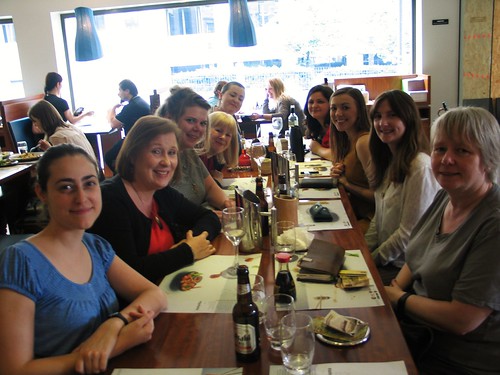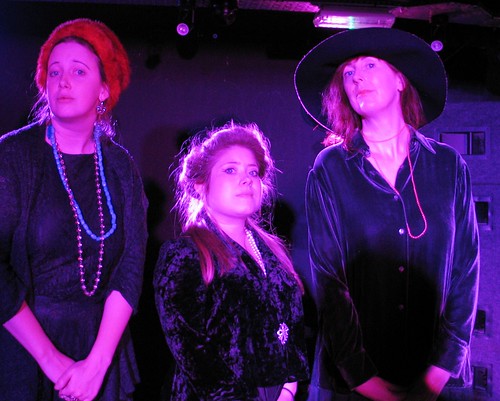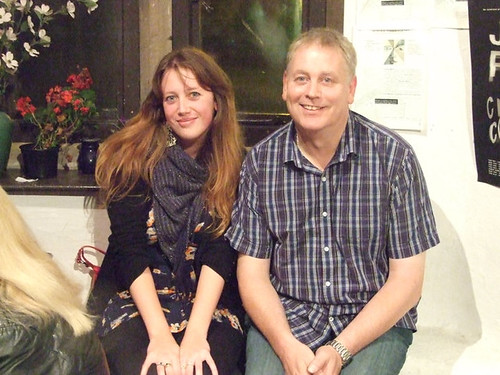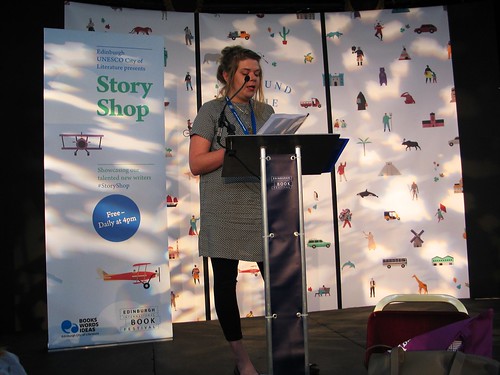Opportunities for writers! Come and work with me!
Friday, September 4th, 2015Hey! Are you a writer, or would you like to be one? Are you looking for any of the following: guidance, community, self-confidence, advice, resources, mentoring, fun? This post is for you. I’m doing lots of exciting stuff at the moment and I would love for YOU to be part of it. Come along…?
Write Like A Grrrl!: the new semester
6-week all-female fiction writing course — starts 21st September
See that gorgeous woman in that photo? That’s Alison Gibson, an alumna of Write Like A Grrrl! March. Way back in March, I nagged a somewhat-uncertain Alison into submitting one of her short stories to Edinburgh International Book Festival‘s prestigious StoryShop programme. Six months later, I sat among a gaggle of Write Like A Grrrl! alumni watching Alison read that story to a rapt crowd in the EIBF’s Spiegeltent theatre. I don’t mean to take all the credit, obviously. But I’m pretty sure that my nagging — and the support she received from the rest of the WLAG! group — was a big factor in Alison getting onto that stage!
Seriously, Write Like A Grrrl! is magical — I’m biased, yes, but I’m also pretty sure that I aint wrong about this! The course is open to women writers of all stripes, no matter where they are in their writing journey. Some folk start WLAG! with half a novel under their belt… they just need to get it finished. Some folk start having done absolutely no writing, ever… they just want to check it out. And many of the women I meet on WLAG! have had their confidence knocked in one way or another — they want to write but they just can’t find the strength.

^ A meeting of just some of the WLAG! alumni — from January, March and May — last month.
WLAG! is all about strength. It’s strength in numbers — you’ll meet eleven other like-minded women writers and trust me, you’ll soon end up down the pub together, geeking out about writing! It’s also about strengthening your routine — making writing a natural part of your life and never a chore — and strengthening the words themselves, making them really sing. To date, women who’ve completed Write Like A Grrrl! Edinburgh have gone on to do things like writing for the Huffington Post, writing for the F Word, winning a major new short story writing prize, and hooking up with a top agent!
You can read some testimonals from the January group (aka ‘the Edinburgh guinea pigs’ — first ever course!) by clicking here. You can read some from the March group by clicking here. And there are some from the May group on this page here.
If all of this sounds good, and you want to find out more, head over to the Write Like A Grrrl! Edinburgh page. The course runs over six consecutive Monday evenings, and costs £72 in total… what’s that? The price of a pair of party shoes? Put on your scruffy old ones and come do some writing instead!
Creatrix Women’s Poetries for the 21st Century: an online Poetry School course
10-week online poetry writing course, open to everyone — goes live 16th September
Just as there are many ways to be a woman, so are there many ways women have written about the female experience. On this course, you’ll look at the ways in which writing by women and about their lives has been traditionally categorised, and find ways to explore and subvert those categorisations in your own writing, exploring within and beyond the dominant narratives and common grounds. You’ll look at feminism, poems that might be called confessional, domesticity, poems about the physical body, the natural world, family, love and relationships. The course will also have an intersectional bent, examining women’s experiences which deal with race, class, sexuality, disability and masculinity. Oh, it’s also taught by me!
‘So, is this women only too?’, you’re thinking? It is not! The course is, in fact, open to all women, all men, and all non-binary people. I’d really like to get a diverse bunch of students onto this course, in fact… men ought to read women, too, after all!

^ Me, Alice Tarbuck and Jane McKie, dressed as great female poets of the past (can you guess which ones?) for the Inky Fingers Dead Poets Slam in 2013
You can read more about the course by clicking through to this interview I did with the Poetry School blog… also contains witches and oversharing about my second collection!
Come along, be inspired by amazing contemporary women poets, find new favourite female writers, meet fellow poets online, and produce new writing of your own that — I hope — moves you out of your comfort zone. The course costs are detailed on the right hand side of this page and the whole thing runs for ten weeks.

^ Me with one of my own mentors, Kevin Cadwallender, at Morden Tower in 2010
Get mentored by me no matter where you live!: my very own Patreon
Ongoing!
OK… with much trepidation, I finally joined the Patreon crowd. However, I’m not asking you to fund me to write poems. Instead, I thought I could use Patreon to extend my ability to teach and mentor new and stuck creative writers. How?, I hear you cry…
Well, I was thinking: if folk are pledging to pay me a little something every month, then why can’t they be buying some of my teaching time with that money? I have a fair few writers from Edinburgh and the surrounding area who I help with line-by-line edits and feedback on their written work. I then meet them for a coffee, or we have a Skype chat, about how they’re doing. This is work I really, really like and the writers seem to get a lot from it. So, I thought, why not extend that to THE WHOLE WORLD? Patreon has helped me do that!
It works like this: you pledge a little bit each month ($5, or the price of a coffee), and I come to your inbox once per month and give you a swift kick up the butt, writing-wise. You’ll receive a pack of electronic goodies from me that will include writing prompts, exercises, useful articles, pointers and words of wisdom, submission calls, job opportunities, commissions… anything I think might help your writing get started, get good, get published. Pledge a bit more, and each month I’ll give you line-by-line edits on one of the pieces you’re working on… top up your pledge and I’ll look at two or three pieces per month. Pledge a little more, and we can have regular Skype chats to see how you’re doing and discuss how you can grow and improve. And so on. It’s a pay-what-you-can mentoring scheme, basically!
I only just set it up, and I haven’t entirely got the hang of it yet, and because I’m British it’s all a bit too much like marching up to people and asking them for money for my liking. So even if you’re not interested in pledging right now, I’d super appreciate it if you’d help me promote it by sharing my Patreon link on Twitter, Facebook, your blog… wherever, really! Thank you!
I hope some of you will join me on these adventures! As always, if you have any questions just drop me a line to claire@onenightstanzas.com or head over to @onenightstanzas on Twitter!
*
Like shiny things? Check out Edinburgh Vintage, a totally unrelated ‘sister site’ full of jewels, treasures and trinkets. If you want to get in touch you can follow OneNightStanzas on Twitter, or email claire[at]onenightstanzas.com. I reply as swiftly as I can!



